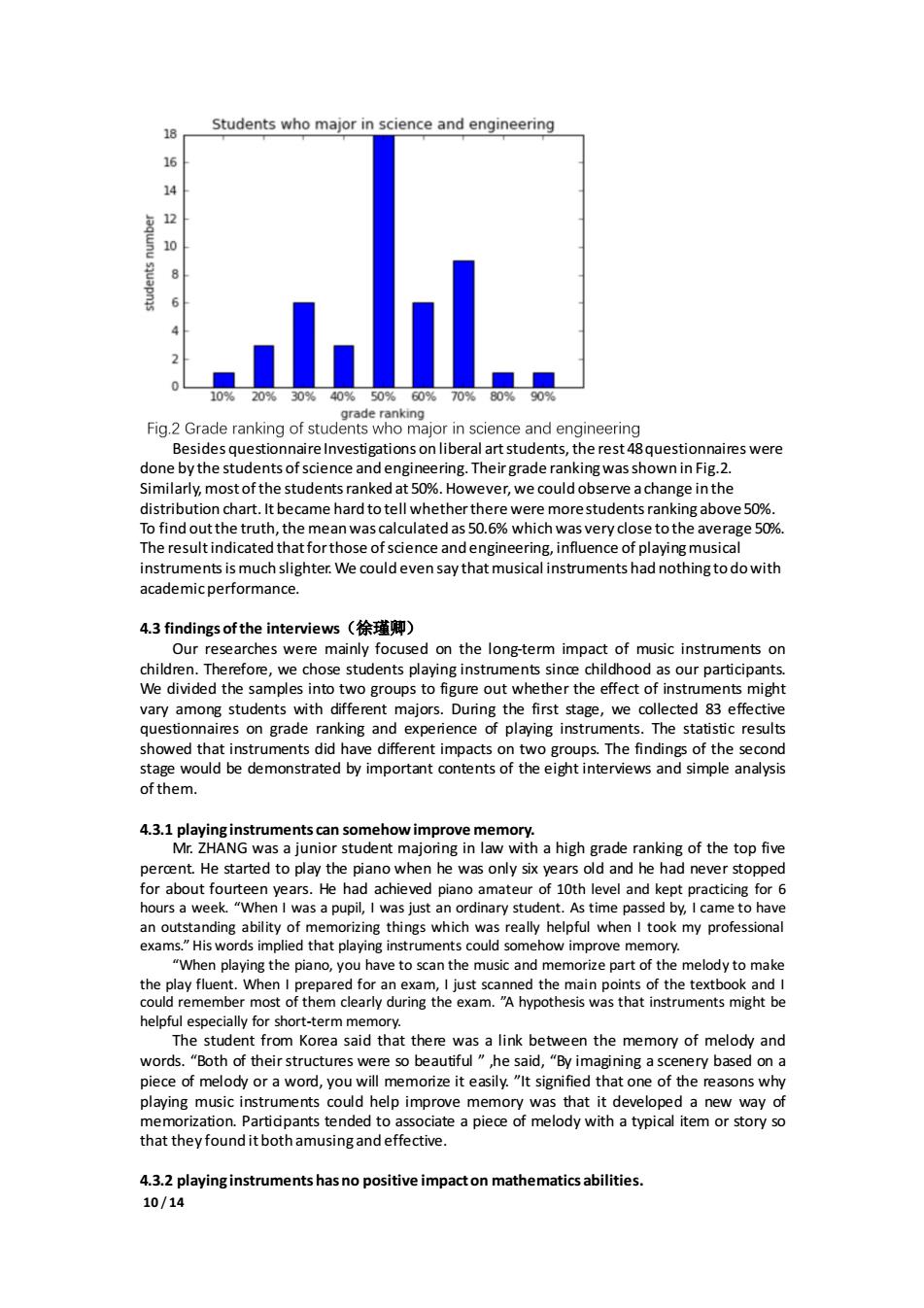正在加载图片...

Students who major in science and engineering 18 16 14 10 6 20% 30% 40%50%60% 70% 80%90% grade ranking Fig.2 Grade ranking of students who major in science and engineering Besides questionnaire Investigations on liberal art students,the rest 48questionnaires were done by the students of science and engineering.Their grade ranking was shown in Fig.2. Similarly,most of the students ranked at 50%.However,we could observe a change in the distribution chart.It became hard to tell whether there were more students ranking above 50% To find out the truth,the mean was calculated as 50.6%which was very close to the average 50%. The result indicated that for those of science and engineering,influence of playing musical instruments is much slighter.We could even say that musical instruments had nothing to do with academic performance. 4.3 findings of the interviews(徐瑾卿) Our researches were mainly focused on the long-term impact of music instruments on children.Therefore,we chose students playing instruments since childhood as our participants. We divided the samples into two groups to figure out whether the effect of instruments might vary among students with different majors.During the first stage,we collected 83 effective questionnaires on grade ranking and experience of playing instruments.The statistic results showed that instruments did have different impacts on two groups.The findings of the second stage would be demonstrated by important contents of the eight interviews and simple analysis of them. 4.3.1 playing instruments can somehow improve memory. Mr.ZHANG was a junior student majoring in law with a high grade ranking of the top five percent.He started to play the piano when he was only six years old and he had never stopped for about fourteen years.He had achieved piano amateur of 10th level and kept practicing for 6 hours a week."When I was a pupil,I was just an ordinary student.As time passed by,I came to have an outstanding ability of memorizing things which was really helpful when I took my professional exams."His words implied that playing instruments could somehow improve memory. "When playing the piano,you have to scan the music and memorize part of the melody to make the play fluent.When I prepared for an exam,I just scanned the main points of the textbook and I could remember most of them clearly during the exam."A hypothesis was that instruments might be helpful especially for short-term memory. The student from Korea said that there was a link between the memory of melody and words."Both of their structures were so beautiful",he said,"By imagining a scenery based on a piece of melody or a word,you will memorize it easily."It signified that one of the reasons why playing music instruments could help improve memory was that it developed a new way of memorization.Participants tended to associate a piece of melody with a typical item or story so that they found it both amusing and effective. 4.3.2 playing instruments has no positive impact on mathematics abilities. 10/1410 / 14 Besides questionnaireInvestigations on liberal artstudents,the rest 48questionnaires were done by the students ofscience and engineering. Their grade rankingwasshown in Fig.2. Similarly,most ofthe studentsranked at 50%.However, we could observe a change in the distribution chart. It became hard to tell whetherthere were morestudentsranking above50%. To find outthe truth,the mean was calculated as 50.6% which was very close to the average 50%. The resultindicated thatforthose ofscience and engineering, influence of playingmusical instrumentsismuch slighter. We could even say thatmusical instruments had nothing to dowith academicperformance. 4.3 findings ofthe interviews(徐瑾卿) Our researches were mainly focused on the long-term impact of music instruments on children. Therefore, we chose students playing instruments since childhood as our participants. We divided the samples into two groups to figure out whether the effect of instruments might vary among students with different majors. During the first stage, we collected 83 effective questionnaires on grade ranking and experience of playing instruments. The statistic results showed that instruments did have different impacts on two groups. The findings of the second stage would be demonstrated by important contents of the eight interviews and simple analysis ofthem. 4.3.1 playing instruments can somehowimprove memory. Mr. ZHANG was a junior student majoring in law with a high grade ranking of the top five percent. He started to play the piano when he was only six years old and he had never stopped for about fourteen years. He had achieved piano amateur of 10th level and kept practicing for 6 hours a week. “When I was a pupil, I was just an ordinary student. As time passed by, I came to have an outstanding ability of memorizing things which was really helpful when I took my professional exams.” His words implied that playing instruments could somehow improve memory. “When playing the piano, you have to scan the music and memorize part of the melody to make the play fluent. When I prepared for an exam, I just scanned the main points of the textbook and I could remember most of them clearly during the exam. ”A hypothesis was that instruments might be helpful especially for short-term memory. The student from Korea said that there was a link between the memory of melody and words. “Both of theirstructures were so beautiful ” ,he said, “By imagining a scenery based on a piece of melody or a word, you will memorize it easily. ”It signified that one of the reasons why playing music instruments could help improve memory was that it developed a new way of memorization. Participants tended to associate a piece of melody with a typical item or story so that they found it both amusing and effective. 4.3.2 playing instruments has no positive impacton mathematics abilities